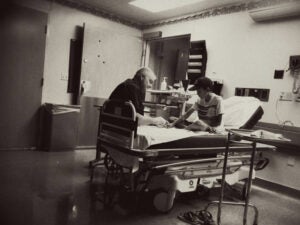This advice – these stories – can be the greatest source of hope and information for families. Whether you’re dealing with a new diagnosis or you’ve been walking the rare journey for some time, being able to hear from someone who knows exactly what you’re going through is refreshing and empowering. We get it.

Years ago, I sat on the floor of an empty hospital hallway at 3 am, scared of the diagnosis my son had recently received. Leaving him asleep in his hospital room, I sat on that floor searching online for anything I could find about his diagnosis. The information was grim, outdated and clinical. I needed relatable information: What will this disease look like on a daily basis? What is my son’s possible future?
I finally found blogs and social media posts from those who were living my son’s disease. That information saved me. I suddenly had explanations about the disease in terms I could understand. I learned about how patients were managing this disease, and I was able to share this information with our own medical team so we could work together to help my son.
Had it not been for the personal stories of patients and caregivers, I would have spent much more time in the isolated darkness of fear. These stories gave us hope. They gave us clues. And, most importantly, they connected us to the rare disease community of those patients and caregivers in ways that the clinical world can’t.
Your story is powerful. Your story is meant to be shared, heard and read – over and over. It is the lifeline for someone in the late-night hours who is struggling. Your story will make a difference.
At PTC, we know just how important your story is and we want to help you share it with others who are looking for inspiration and hope. We’d like to partner with you to tell your story in a way you feel can help others who are on a similar journey. No stories will be shared publicly without your written authorization.
Please contact us at shareyourstory@ptcbio.com for information, and one of our Patient Engagement Liaisons will reach out to you if your story is a fit.